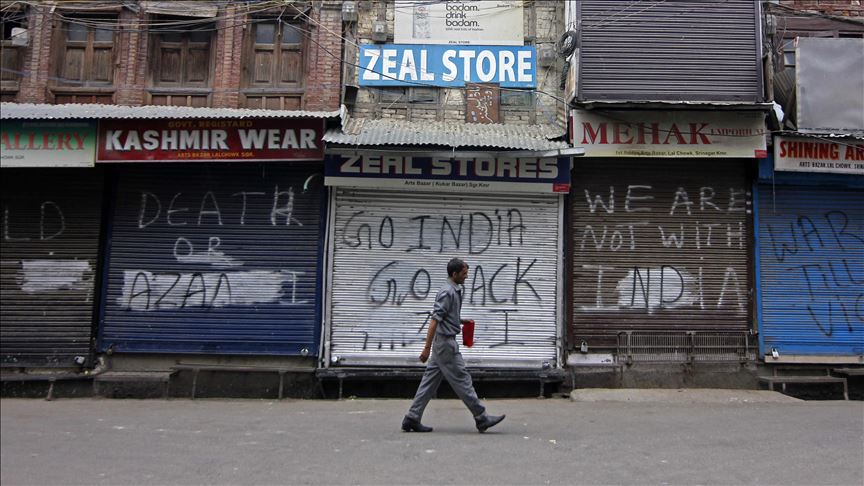Daily life in Kashmir suffers amid lockdown
Locals protest India's revocation of Kashmir's special status, bringing economy, education, transport to a near standstill
 file photo
file photo
SRINAGAR, Jammu and Kashmir
For over a month, businessman Mohammed Yaseen has opened his shop early in the morning for a few hours before closing it again.
"We don't do much business these days. We have only a few hours to work…I close shop by 11 a.m. [local time (0530GMT)] and then leave for home," said Yaseen, who sells Kashmiri shawls in Srinagar. "For the rest of the day, I keep my shop closed to protest against the Indian government’s decision.”
Yaseen was referring to the Indian government’s decision on Aug. 5 to scrap the region's special status and bifurcate Jammu and Kashmir into two Union Territories.
In protest against the measures, local businesses have been observing a self-imposed shutdown.
The daily schedules of the people have also changed since the lockdown.
With schools shut and students staying at home, many have been taking classes from private tutors.
"I didn't visit the school because my parents are not allowing it…there have been no classes at my school since August because of the situation. I'm completely dependent on tutors now. I will go to tutors early in the morning and spend most of my time at home," said Saliq Ahmad, a local high school student. "I don't think schools will open again for some time. After my exams are finished, I will start coaching for the next class.”
For teachers who arrive at the schools early every morning, there are no students to teach, as parents prefer not to send their children due to the situation.
"There was a set routine for me, and I would go to school every day and teach the students. These days, I do go to school, but we have nothing to do as there are no students. The day-to-day schedule has taken a hit, undoubtedly, because of what is happening in Kashmir," Zubair Ahmad, a teacher at a renowned school in Srinagar, told Anadolu Agency.
"I used to go for home tuition as well, but that schedule has been affected. If my student has any doubt while studying, he calls me and then I clear up the confusion."
High schools in the region are currently holding annual exams that students must pass to advance to the next grade. The authorities have said that 100% of students attended these exams.
On the night of Aug. 4 and 5, New Delhi imposed a curfew and information blockade in the region ahead of its decision to scrap the state's special powers. While the government gradually lifted restrictions, locals have also been imposing a shutdown, with businesses not opening and public transport vehicles staying off the roads.
"There is no public transport on roads, and I have to walk several kilometers and even ask for lifts to reach my office daily," said Zahoor Ahmad, a government employee in Srinagar. "This is because of the Indian government’s decision. Things are a mess here. I hope things get better.”
On Oct. 14, the government restored postpaid mobile services in the area, but even after 90 days passed, internet services continued to be suspended.
"Our business is completely dependent on the internet," said Ghulam Nabi, who owns a travel agency in Srinagar.
"But since we haven't had the internet for the past three months, our business is 100% affected. If I have to book a ticket now for a customer, I call my friend in Delhi and ask him to log in with my ID so tickets can be booked," he said.
He added that he must visit a government-run internet facility, where he can log in twice a week for one hour each to check his emails.
"Earlier, I would even book my tickets at home even at nights. But today, I can only book a ticket for my customer when someone is available in Delhi to access the internet."
The absence of an internet connection has dealt a severe blow to the region’s tourism and IT sectors, said Sheikh Aashiq, president of the Kashmir Chamber of Commerce and Industry.
"We believe there is a business loss of Rs 10,000 crore [$1.4 billion] due to the lockdown in Kashmir since Aug. 5. There has also been a loss of jobs for more than 100,000 people. Kashmir’s business sector is bleeding at the moment. The tourism and IT sectors are mostly dependent on the internet, and right now, they are suffering badly because there is no internet," said Aashiq.
Anadolu Agency website contains only a portion of the news stories offered to subscribers in the AA News Broadcasting System (HAS), and in summarized form. Please contact us for subscription options.







